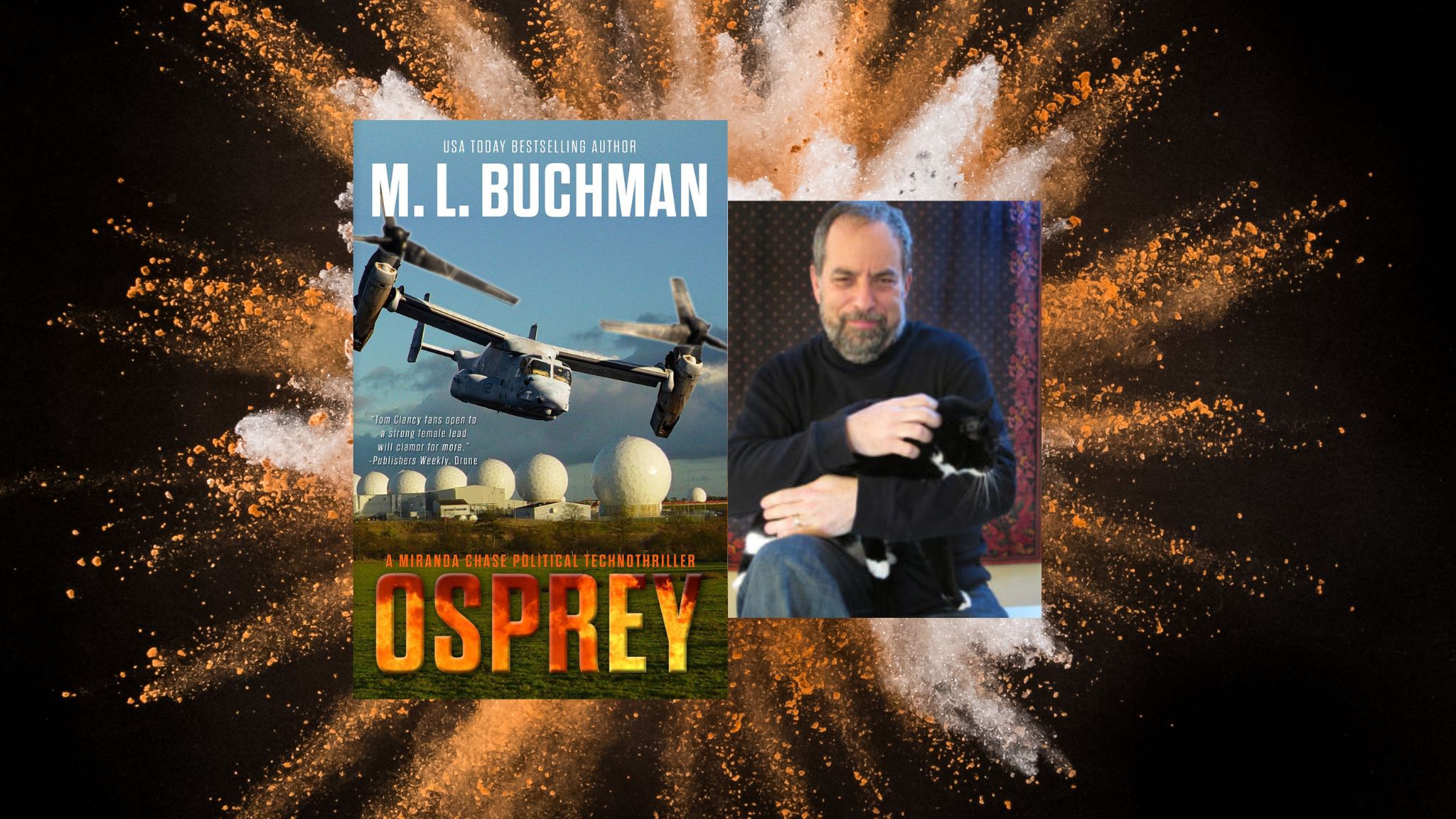He’s written more than 70 books and is drawing heavy praise for his recurring female protagonist, an autistic who happens to be a genius air-crash investigator. In Miranda Chase, author M.L. Buchman has given readers a most compelling lead character in his fast-growing series of political technothrillers.
His latest book featuring Miranda is Osprey. In this recent BookTrib interview, Buchman talked about his unusual and storied background, where his ideas come from, and where his writing is headed.
Q: How have your many varied life experiences—flying from South Korea to ride across the Australian Outback as part of an around-the-world bicycle trip, to your many hobbies and interests—shaped what you write about?
A: My Mid-life Crisis on Wheels sent me through 15 countries by bicycle in a year and a half. I became a writer on that trip. Partly from the many new experiences, but partly due to emerging from the grind of 80-hour work weeks as I fought my way up the corporate ladder. Losing everything—career, house, car—offered a chance to reset and restart.
I often say that the many paths I’d followed—pilot, sailor, live theater technician, IT, lean manufacturing, and more—made me a translator, able to speak many languages. It also let me see and hear those many voices.
Q: You have gravitated primarily to the genres of military romantic suspense and political technothrillers. Where and how do you come up with your story ideas?
A: When seeking plot, I look at the world around me and ask a few basic questions. What scares me? What do I wish I could understand better? What do I wish I could change? There are a thousand things around us that need fixing, that need care. Every one of them contains story, if I can only find it.
Q: You have introduced readers to a strong recurring female protagonist Miranda Chase. Tell us about her, what drives her, her flaws, her strengths—and why readers will fall in love with her.
A: I love Miranda so much. She was, of course, born of a long process, dating back much further than the dozen novels she’s starred in. On the surface she is an autistic, bewildered by the people around her. Emotions, including her own, are a complete mystery to her. Yet in contrast, her singular focus—solving plane crashes to make future air travel safer—is all about emotion as that’s how her parents died.
Not understanding people, she offers and evokes loyalty. Not understanding motives, her motives are pure as crystal. Struggling to understand herself, as we all do, and against such odds, gives us hope for her and for ourselves.
Q: What is the primary storyline of your latest work, Osprey?
As with all my books, nothing is ever as simple as it looks. On one level, Osprey is about how close lies the tipping point to the next major war. Is it near enough that a single mistake could launch us into a global horror? In Osprey, an aggressively close fly-by goes wrong. Do we think—or react? Does Russia think—or react?
As that pressure escalates, it also squeezes the people caught at the center. Under that intense stress, what ramifications explode from a single personal mistake? What are the threads and connections within a team, specifically Miranda’s team, that fray under the threat of war? And how do they, and we, survive them?
Q: You have written 75 novels and 100 short stories. What kind of discipline does it take to accomplish that?
A: In many ways, it isn’t discipline; it’s lack of choice. With a dozen lifetimes I doubt that I could run out of stories to tell. I find this amusing, as I never thought of myself as a storyteller, and I came to writing fiction only in my mid-thirties. Or rather it came to me. I started my first novel as a humorous protest against the divisiveness I was witnessing between religions as I traveled around the world. They all teach the same core principles yet are often driven to war by the different surface teachings. Cookbook from Hell: Reheated was my cry of protest. As long as there is injustice, cruelty, discrimination, and all the rest of it, how could I not rail against it?
Q: What do you hope readers take away from your books?
A: You said the word right there, “hope.” There are two keys to the future that I would like my readers to experience: a wider view of the world, and hope. The first, because only by having a better understanding of the world we live in can we affect change for the better. And hope? Faith that a few individuals, fighting the good fight at whatever level, can change the world for the better. Whether it is flying into battle, fighting wildfires, or adding a smile to someone’s day, that is my true goal.




